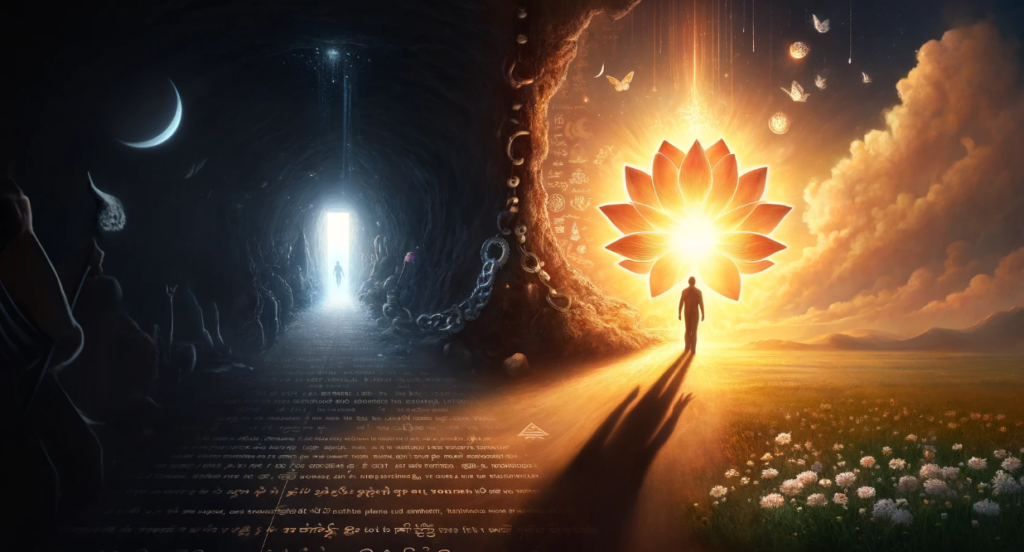
In our fast-paced digital age, where information doubles every few hours, ancient wisdom traditions offer us a surprising insight: Sometimes, knowing less is knowing more. That actual knowledge emerges not from the aggressive acquisition of information but from the gentle dissolution of our preconceptions.
In both Plato’s Allegory of the Cave and the Upanishadic story of Shvetaketu, we encounter this profound truth that our most significant obstacle to wisdom often lies not in what we do not know but in what we think we know.
In Plato’s cave, prisoners mistake shadows for reality, their worldview constructed from mere projections on a wall. Similarly, young Shvetaketu returns from twelve years of Vedic education, pride swelling in his accumulated knowledge, only to have his father, Uddalaka, gently guide him toward a more profound truth through the simple metaphor of a fig tree.
The parallels are striking:
- The prisoners’ chains represent our attachment to familiar perspectives
- The shadows symbolize our mistaking superficial knowledge for deep understanding
- The journey out of the cave mirrors Shvetaketu’s unlearning process
- The initial resistance to new truth appears in both tales
Consider how:
- Modern education emphasizes information acquisition, while ancient wisdom stresses the importance of inner clarity
- Technology multiplies our access to knowledge yet may decrease our capacity for deep understanding
- Social media amplifies opinions, potentially reinforcing our cave-like echo chambers
- Intellectual achievements, like Shvetaketu’s education, can paradoxically reinforce ego-based limitations
Beyond the Mind’s Horizon
The transformation these stories point to is not merely intellectual—it is experiential and profound. Just as the freed prisoner must painfully adjust to the sun’s light, and Shvetaketu must repeatedly contemplate “That art thou” (Tat tvam asi), genuine wisdom requires us to undergo a fundamental shift in consciousness. This shift moves us:
- From knowledge to knowing
- From accumulation to realization
- From complexity to simplicity
- From intellectual understanding to direct perception
The Contemporary Relevance
These ancient teachings find striking resonance in contemporary fields:
- Quantum physics reveals a reality far different from our everyday perceptions
- Neuroscience shows how our brains construct reality rather than merely perceive it
- Psychological studies demonstrate how cognitive biases limit our understanding
- Mindfulness practices emphasize the value of a “beginner’s mind.”
The Path Forward
The journey toward wisdom, as suggested by both traditions, requires:
- Humility to question our existing knowledge
- Courage to face the unknown
- Patience allows deeper understanding to emerge
- Willingness to transcend the limitations of ego
“The soul is like an eye: when it rests upon that truth and being shine, it perceives and understands and is radiant with intelligence; but when it turns to that which is mingled with darkness, it has only opinions and is dimmed.”
– Plato, The Republic
“Tat tvam asi” (“That art thou”) – a reminder of the oneness of self and the universe, encouraging the seeker to look beyond appearances.
– Upanishads, Chandogya Upanishad (Shvetaketu’s story)
“To know yet to think that one does not know is best; not to know yet to think that one knows will lead to difficulty.”
— Lao Tzu, Tao Te Ching
“I know that I am intelligent because I know that I know nothing.” – emphasizing humility and the awareness of one’s limitations.
– Socrates
“Ultimately, these things matter most: How well did you love? How fully did you live? How deeply did you let go?”
– Buddha
“What we are looking for is what is looking.”
— St. Francis of Assisi
“The knowledge of the self is the mother of all knowledge. So it is incumbent on me to know myself, to know it completely.”
– Rumi
“Your Self-Realization is the greatest service you can render the world.”
– Sri Ramana Maharshi
“The more I learn, the more I realize how much I do not know.”
— Albert Einstein
“We do not find the meaning of life alone – we find it with another.”
– Thomas Merton
“Who looks outside, dreams; who looks inside, awakes.”
– Carl Jung
“Knowledge is knowing that we cannot know.”
— Ralph Waldo Emerson
“You think because you understand one, you must understand two because one and one makes two. However, you must also understand and.”
– Sufi Proverb


